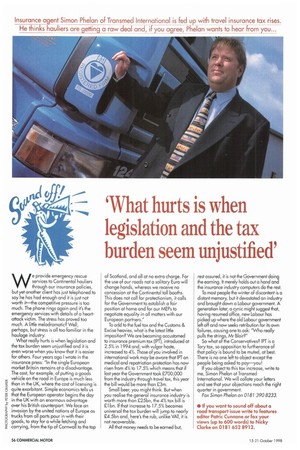Insurance agent Simon Phelan of Transmed International is fed up
Page 58

If you've noticed an error in this article please click here to report it so we can fix it.
with travel insurance tax rises. He thinks hauliers are getting a raw deal and, if you agree, Phelan wants to hear from you...
'What hurts is when legislation and the tax burden seem unjustified'
We provide emergency rescue services to Continental hauliers through our insurance policies, but yet another client has just telephoned to say he has had enough and it is just not worth it—the competitive pressure is too much. The phone rings again and it's the emergency services with details of a heartattack victim. The stress has proved too much. A little melodramatic? Well, perhaps, but stress is all too familiar in the haulage industry.
What really hurts is when legislation and the tax burden seem unjustified and it is even worse when you know that it is easier for others, Four years ago I wrote in the insurance press: "In the single European market Britain remains at a disadvantage. The cost, for example, of putting a goods vehicle on the road in Europe is much less than in the UK, where the cost of licensing is quite exorbitant. Simple economics tells us that the European operator begins the day in the UK with an enormous advantage over his British counterpart. We face an invasion by the united nations of Europe as trucks from all parts pour in with their goods, to stay for a while fetching and carrying, from the tip of Cornwall to the top of Scotland, and all at no extra charge. For the use of our roads not a solitary Euro will change hands, whereas we receive no concession at the Continental toll booths. This does not call for protectionism, it calls for the Government to establish a fair position at home and for our MEPs to negotiate equality in all matters with our European partners."
To add to the fuel tax and the Customs & Excise heavies, what is the latest little imposition? We are becoming accustomed to insurance premium tax (IPT), introduced at 2.5% in 1994 and, with vulgar haste, increased to 4%. Those of you involved in international work may be aware that IPT on medical and repatriation protection has now risen from 4% to 17.5% which means that if last year the Government took £700,000 from the industry through travel tax, this year the bill would be more than £3m.
Small beer, you might think. But when you realise the general insurance industry is worth more than £25bn, the 4% tax bill is £1bn. If that increase to 17.5% becomes universal the tax burden will jump to nearly £4.5bn and, here's the rub, unlike VAT, it is not recoverable.
All that money needs to be earned but, rest assured, it is not the Government doing the earning. It merely holds out a hand and the insurance industry computers do the rest. To most people the winter of discontent is a distant memory, but it devastated an industry and brought down a Labour government. A generation later, a cynic might suggest that, having resumed office, new Labour has picked up where the old Labour government left off and now seeks retribution For its own failures, causing one to ask: 'Who really pulls the strings, Mr Blair?" So what of the Conservatives? IPT is a Tory tax, so opposition to furtherance of that policy is bound to be muted, at best. There is no one left to object except the people being asked to pay—you! If you object to this tax increase, write to me, Simon Phelan at Transmed International. We will collate your letters and see that your objections reach the right quarter in government. Fox Simon Phelan on 0181 390 8233.
• If you want to sound off about a road transport issue write to features editor Patric Cunnane or fax your views (up to 600 words) to Nicicy Clarke on 0181 652 8912.




















































































































